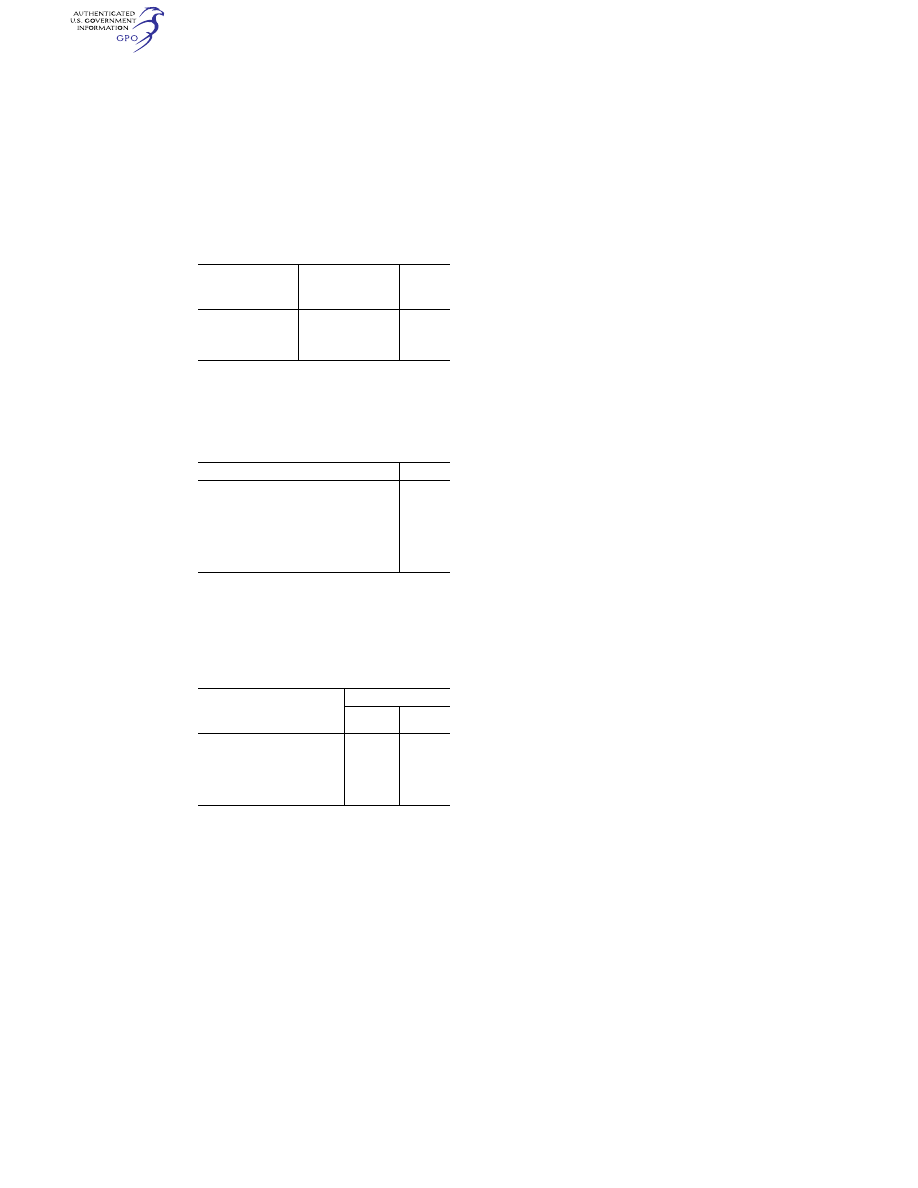
555
Federal Aviation Administration, DOT
§ 27.1401
Dihedral angle (light in-
cluded)
Angle from right or left
of longitudinal axis,
measured from dead
ahead
Intensity
(candles)
L and R (forward red
and green).
10
°
to 10
°
...................
10
°
to 20
°
...................
20
°
to 110
°
.................
40
30
5
A (rear white) ..............
110
°
to 180
°
...............
20
§ 27.1393
Minimum intensities in any
vertical plane of forward and rear
position lights.
Each position light intensity must
equal or exceed the applicable values in
the following table:
Angle above or below the horizontal plane
Intensity, l
0
°
.........................................................................
1.00
0
°
to 5
°
................................................................
0.90
5
°
to 10
°
..............................................................
0.80
10
°
to 15
°
............................................................
0.70
15
°
to 20
°
............................................................
0.50
20
°
to 30
°
............................................................
0.30
30
°
to 40
°
............................................................
0.10
40
°
to 90
°
............................................................
0.05
§ 27.1395
Maximum intensities in over-
lapping beams of forward and rear
position lights.
No position light intensity may ex-
ceed the applicable values in the fol-
lowing table, except as provided in
§ 27.1389(b)(3).
Overlaps
Maximum Intensity
Area A
(candles)
Area B
(candles)
Green in dihedral angle L .............
10 1
Red in dihedral angle R ................
10 1
Green in dihedral angle A .............
5 1
Red in dihedral angle A ................
5 1
Rear white in dihedral angle L ......
5 1
Rear white in dihedral angle R .....
5 1
Where—
(a) Area A includes all directions in
the adjacent dihedral angle that pass
through the light source and intersect
the common boundary plane at more
than 10 degrees but less than 20 de-
grees, and
(b) Area B includes all directions in
the adjacent dihedral angle that pass
through the light source and intersect
the common boundary plane at more
than 20 degrees.
§ 27.1397
Color specifications.
Each position light color must have
the applicable International Commis-
sion on Illumination chromaticity co-
ordinates as follows:
(a)
Aviation red—
y is not greater than 0.335; and
z is not greater than 0.002.
(b)
Aviation green—
x is not greater than 0.440
¥
0.320
y;
x is not greater than y
¥
0.170; and
y is not less than 0.390
¥
0.170
x.
(c)
Aviation white—
x is not less than 0.300 and not greater than
0.540;
y is not less than x
¥
0.040’’ or
y
c
¥
0.010,
whichever is the smaller; and
y is not greater than x + 0.020 nor
0.636
¥
0.400
x;
Where
y
c
is the
y coordinate of the Planck-
ian radiator for the value of
x considered.
[Doc. No. 5074, 29 FR 15695, Nov. 24, 1964, as
amended by Amdt. 27–6, 36 FR 12972, July 10,
1971]
§ 27.1399
Riding light.
(a) Each riding light required for
water operation must be installed so
that it can—
(1) Show a white light for at least
two nautical miles at night under clear
atmospheric conditions; and
(2) Show a maximum practicable un-
broken light with the rotorcraft on the
water.
(b) Externally hung lights may be
used.
[Doc. No. 5074, 29 FR 15695, Nov. 24, 1964, as
amended by Amdt. 27–2, 33 FR 964, Jan. 26,
1968]
§ 27.1401
Anticollision light system.
(a)
General. If certification for night
operation is requested, the rotorcraft
must have an anticollision light sys-
tem that—
(1) Consists of one or more approved
anticollision lights located so that
their emitted light will not impair the
crew’s vision or detract from the con-
spicuity of the position lights; and
(2) Meets the requirements of para-
graphs (b) through (f) of this section.
(b)
Field of coverage. The system must
consist of enough lights to illuminate
the vital areas around the rotorcraft,
considering the physical configuration
and flight characteristics of the rotor-
craft. The field of coverage must ex-
tend in each direction within at least
30 degrees below the horizontal plane of
the rotorcraft, except that there may
VerDate Sep<11>2014
09:06 Jun 28, 2024
Jkt 262046
PO 00000
Frm 00565
Fmt 8010
Sfmt 8010
Y:\SGML\262046.XXX
262046
jspears on DSK121TN23PROD with CFR